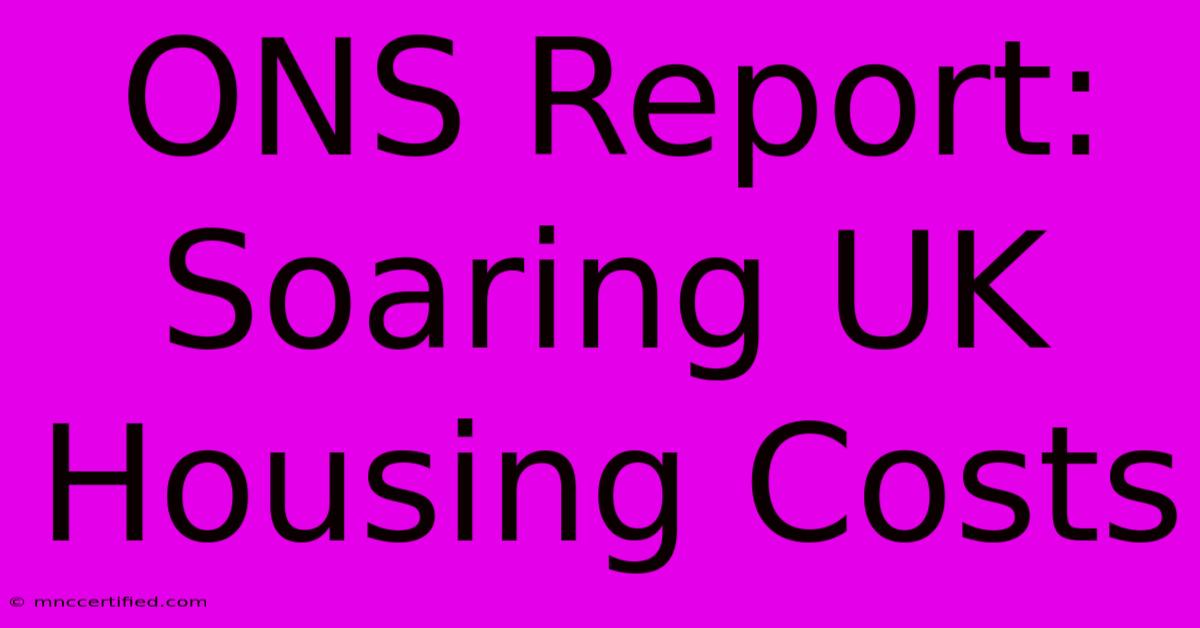ONS Report: Soaring UK Housing Costs

Table of Contents
ONS Report: Soaring UK Housing Costs – A Deep Dive into the Crisis
The Office for National Statistics (ONS) recently released a report highlighting a dramatic surge in UK housing costs, sending shockwaves through the nation. This isn't just a headline; it's a crisis impacting millions, affecting everything from personal finances to the wider economy. This article delves into the key findings of the ONS report, exploring the underlying causes and potential consequences of this alarming trend.
Key Findings of the ONS Report: A Stark Reality
The ONS report paints a stark picture of the UK housing market. Key findings include:
- Record High House Prices: The report confirms a continued upward trend in house prices, exceeding expectations and leaving many aspiring homeowners priced out of the market. Specific regional variations will be crucial to consider in further analysis, as disparities between London and the rest of the UK are significant.
- Renting Crisis: Rental costs have also skyrocketed, placing immense pressure on renters across the UK. The report likely details the increasing difficulty in finding affordable rental properties, particularly in urban areas with high demand.
- Impact on Household Finances: The combined effect of rising house prices and rents is squeezing household finances, leaving less disposable income for other essential goods and services. The report will undoubtedly show how this impacts consumer spending and overall economic health.
- Regional Disparities: While the national picture is alarming, the report likely highlights significant regional variations in housing costs, emphasizing the uneven distribution of the crisis across the country. This geographic analysis is critical for understanding the localized impacts.
Understanding the Drivers Behind the Crisis
Several factors contribute to the soaring UK housing costs detailed in the ONS report:
- Supply and Demand Imbalance: A chronic shortage of housing supply, particularly affordable housing, is a major driver. Increased demand, coupled with insufficient new builds, fuels price inflation. The report may analyze planning permission delays and construction costs as contributing factors.
- Inflation and Interest Rates: Rising inflation and interest rate hikes directly impact mortgage affordability, making it harder for people to buy homes. The report will likely correlate these macroeconomic factors with the observed increase in housing costs.
- Increased Building Costs: The cost of building materials and labor has risen sharply, further contributing to higher house prices and rental costs. This impact on the construction industry is a key aspect the ONS likely addresses.
- Government Policies (or lack thereof): The effectiveness (or lack thereof) of government policies aimed at addressing the housing crisis is another key element for analysis. The report may assess the impact of recent policy changes (or inaction) on the current situation.
The Wider Implications: Beyond Personal Finances
The consequences of this housing crisis extend far beyond personal finances. The ONS report likely touches on:
- Economic Impact: Reduced consumer spending due to high housing costs can negatively impact overall economic growth. This ripple effect should be a major point of discussion in the report’s analysis.
- Social Inequality: The crisis disproportionately affects low- and middle-income households, exacerbating existing social inequalities. The report likely provides data highlighting this disparity.
- Regional Development: High housing costs in certain areas can hinder economic development and population growth, potentially creating imbalances across the country. The geographic analysis within the report should highlight these potential issues.
Looking Ahead: Potential Solutions and Future Outlook
Addressing this crisis requires a multifaceted approach. The ONS report may offer suggestions or indirectly highlight the need for:
- Increased Housing Supply: Significant investment in new affordable housing is crucial. This includes streamlining planning permissions and incentivizing construction.
- Rental Reform: Strengthening renter rights and improving the regulation of the private rental sector is essential to ensure affordability and stability.
- Financial Support: Government schemes to help people afford housing, such as mortgage guarantees or rental assistance, may be considered as part of the solution.
- Long-term Planning: Sustainable and strategic long-term planning for housing development is needed to address the issue proactively.
The ONS report on soaring UK housing costs serves as a wake-up call. Addressing this complex issue requires urgent action, collaboration between government, developers, and other stakeholders, and a commitment to creating a more equitable and affordable housing market for all. By understanding the key findings and implications, we can work towards solutions that ensure a more stable and prosperous future for the UK.

Thank you for visiting our website wich cover about ONS Report: Soaring UK Housing Costs. We hope the information provided has been useful to you. Feel free to contact us if you have any questions or need further assistance. See you next time and dont miss to bookmark.
Featured Posts
-
Sonic 3 Carreys Confirmed Role
Dec 12, 2024
-
Mayweather Attack London Denial
Dec 12, 2024
-
Qpr Victory Fields Crucial Brace
Dec 12, 2024
-
Gchqs 2024 Holiday Puzzle
Dec 12, 2024
-
Jd On 2025 Enforcement Trends
Dec 12, 2024